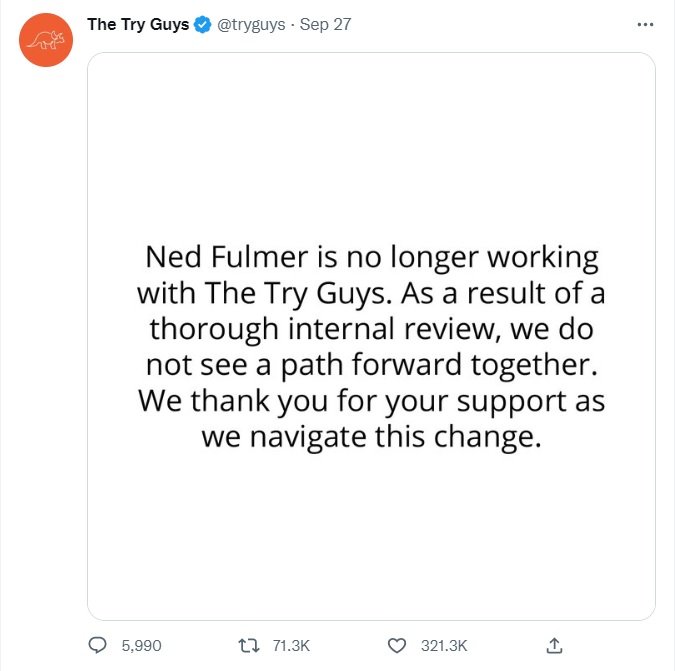
I have a somewhat different perspective on the Try Guys/Ned Fulmer situation given that I’m a business and internet lawyer as well as someone who has built a business from scratch.
Disclaimer: I am not at all involved in this situation. I’m just a person with legal knowledge who is watching from the sidelines. Also, I’m a fan of the Try Guys, so my analysis may be biased in their favor.
Quick Overview of the Situation
Eugene Lee Yang, Zach Kornfeld, Keith Habersberger, and Ned Fulmer were four guys who worked at Buzzfeed but then left to start their own business based on a YouTube channel called The Try Guys. The channel has millions of subscribers.
A few weeks ago, it came out that Ned, who’s married, was having an affair with one of his employees, Alexandria Herring, after photos of the two kissing were posted online. Shortly thereafter, the Try Guys released a post that Ned was no longer with the company followed by a scripted video entitled “What Happened.”
Some of the online reactions said the guys were acting like they were self-important and acting as if Ned cheated on them, not his wife.
Now that we’re all on the same page, here’s my two cents:

The “What Happened” Video Wasn’t as Self-Important as Some People Say.
As YouTubers, the Try Guys put a lot of their personal lives and feelings on the internet. Sharing what happened and how they felt about it was on-brand for them.
I also wondered if they’d been holding it together for weeks, keeping everything hush hush as they were investigating what happened and deciding what they were going to do, and this video was their first chance to vent how they really felt.
Ned Cheated on The Try Guys as Business Partners.
The Try Guys seemed to put their hearts and soul into this business without a Plan B if it didn’t work out. They based their professional futures and livelihoods on the belief that the Try Guys would be a successful business. Like many entrepreneurs, myself included, there is no differentiation between when their professional and personal lives.
As Eugene, Zach, and Keith said in their video, Ned went against the values of the company that the four of them had created together. When they learned about Ned’s infidelity, they were rightfully worried about how this news would impact their company’s reputation and future opportunities. Not only were they worried about their company’s future, but also for their employees who rely on their jobs to provide for their families.

Ned Shit the Bed and the Remaining Try Guys are Left to Clean it Up.
It’s important to remember that these guys weren’t just co-workers, they’re co-owners of a company. They’re creating content and running a business. It’s basically two full-time jobs in one.
As the Try Guys said in their “What Happened” video, they felt they had found their cadence where their company was consistently creating content and they finally had enough time to explore other personal projects as well. Just as they had established this balance, Ned, through his actions, fucked all that up.
The Try Guys had to drop everything and deal with hiring someone to do an HR investigation and talk to lawyers all day to figure out what they could and couldn’t do. Given what they do for a living and that they live in Los Angeles, I would not be surprised if their lawyers cost $500/hour. Dealing with this situation could have easily has cost them tens of $1000s so far. On top of that, The Try Guys had created weeks’, if not months’ worth of videos, that probably cost $1000s to make, and now have to be scrapped because there’s no way to edit around Ned. They also reduced their publication schedule from two videos a week to one, so that means less revenue coming in. So not only are they having to deal with substantial unexpected expenses, but they’ve also lost money on top of that that they’ll never recoup.

The Try Guys Aren’t Done Dealing with the Ned Situation.
While everyone else is moving on to the next internet drama de jour, the Try Guys are still dealing with this. I suspect they’re still having regular contact with their lawyers as they continue to clean up the figurative debris from this mess.
Alexandria Herring was listed as an Associate Producer for the company until their latest video. It was clear from the responses from others in the company, it would not be a work environment for her to remain employed there. I bet she wasn’t terminated when Ned was voted out because they had to work with their legal team to give her a severance package that would allow them to terminate her employment without bringing a lawsuit onto themselves.
Additionally, even though they voted Ned out of the company, the remaining Try Guys are still dealing with him from a legal perspective. He may be gone as a creator, but he’s still an owner of the company. To get rid of him completely, somebody has to buy his ownership interest.
Assuming each of the Try Guys owns 25% of the company, they have to determine what the entire company is worth, and negotiate a buy/sell agreement to purchase Ned’s 25%. Finding a company that performs business valuations and having it done can take weeks, and then there could be weeks of negotiations about the contract’s terms, including releases of liability. If I were a surviving owner, I’d want all the costs of having to deal with the Ned situation to be deducted from the purchase price of Ned’s share.
The only way I can think that would prevent the Try Guys from having to buy Ned out would be if they had an operating agreement in place that said certain bad acts by an owner would result in that owner forfeiting their ownership interest in the company and getting kicked out with nothing. My gut says that didn’t happen in this situation because, as of October 28th, Ned (meaning Fulmer Media Inc.) was still listed as an owner of the company on the California business entity database.
So, while Ned is doing his own thing, the other three guys have had to take a lot of time and energy away from what they want to be doing to clean up Ned’s mess, keep the company going in the interim, and probably will have to give him a lot of money to make him go away.
Given all this, if I were Eugene, Zach, and Keith, I’d be pretty upset too.








